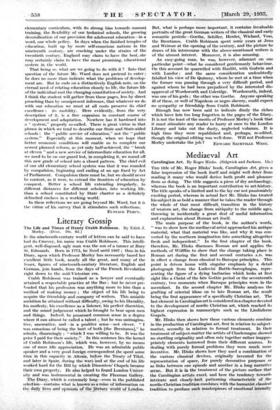Literary Gossip
IF the nineteenth-century world of letters can be said to have had its Creevey, his name was Crabb Robinson. This intelli- gent, well-disposed, ugly man was the son of a tanner at Bury St. Edmunds. Born in 1775, he lived until 1867 ; thus in his Diary, upon which Professor Morley has necessarily based her excellent little book, nearly all the great, and many of the leaser, figures of nineteenth-century literature, English and German, join hands, from the days of the French Revolution right down to the mid-Victorian era.
Crabb Robinson was trained as -a lawyer and eventually attained a respectable practice at the Bar ; but he never pre- tended that his profession was anything more to him than a method of making money ; the object of his life being to acquire the friendship and company of writers. This amiable anibition he attained without difficulty,, owing to his liberality, his modesty, his excellence as a listener, his perfect discretion, and the sound judgement which he brought to bear upon men and things. Indeed, he possessed common sense in a degree
where it can almost be called a talent ; but he was unimagina.•tive, uncreative, and—in a positive sense—not clever. , " I was conscious of being the butt of both [the Brentanos]," he admits, disarmingly ; " which I was willing to be. It was the price I paid for their society." In this sentence lies the kernel of ,Crabb Robinson's life, which was, however, by no means one of- mere idle appreciation. He was an admirable public speaker and a very good foreign correspondent (he spentiome time in this capacity in Altona, before the Treaty of Tilsit, and later in Spain, during the war) -nnil at tile „end of his life worked hard for the Bill by which Dissenters' Chapels became their oivn property. He also helped to found London-Univer- 5itY and was instrumental in creating the Flaxman Gallery. The 'Diary, which is extremely long—even in the published seleetkiii.-contains what is known:as a mine of.inforrnation on the daily and oPiniOrfa the-liteitiry Vbrld 'of LondOn. But, what is perhaps more important, it contains invaluable portraits of the great German writers of the classical and early romantic periods--Goethe, Schiller, Herder,, Wieland, Voss, the Brentanos. Crabb Robinson spent some years at Jena and Weimar at the opening of the century, and the picture he draws of his intercourse with the above-mentioned writers is of the utmost interest. Moreover, it is also amusing.
An easy-going man, he was, however, adamant on one particular point—what he considered gentlemanly behaviour. On this account he quarrelled with Hazlitt, with Godwin and with Landor ; and the same consideration undoubtedly falsified his view of De Quincey, whom he met at a time when the former was passing through a very difficult period, and against whom he had been prejudiced by the interested dis- approval of Wordsworth and Coleridge. Wordsworth, indeed, was one of his gods ; the other was Goethe. Anyone speaking ill of these, or well of Napoleon or negro slavery, could expect no sympathy or friendship from Crabb Robinson.
Enough has now been said to indicate dimly the riches which have lain too long forgotten in the pages of the Diary. It is not the least of the merits of Professor Morley's book that it must stimulate any reader to hurry at once to the London Library and take out the dusty, neglected volumes. It is high time they were republished and, perhaps, re-edited, though the original editing was well done. Will not Professor






































 Previous page
Previous page